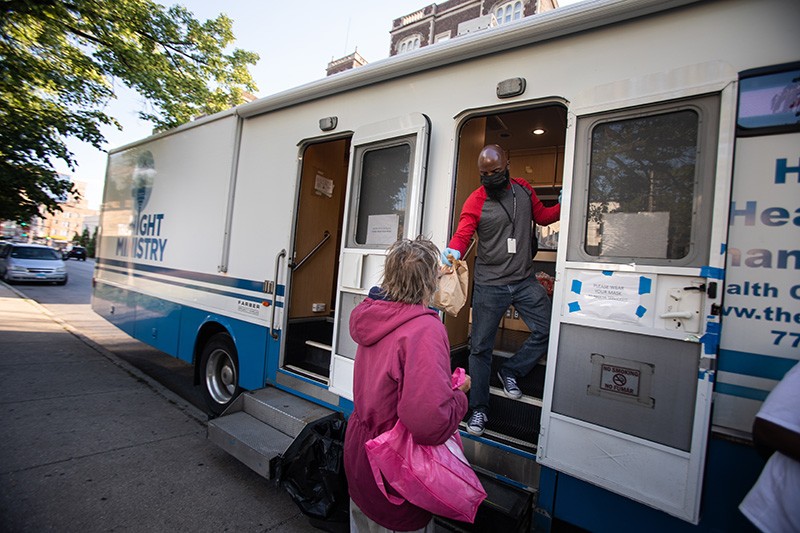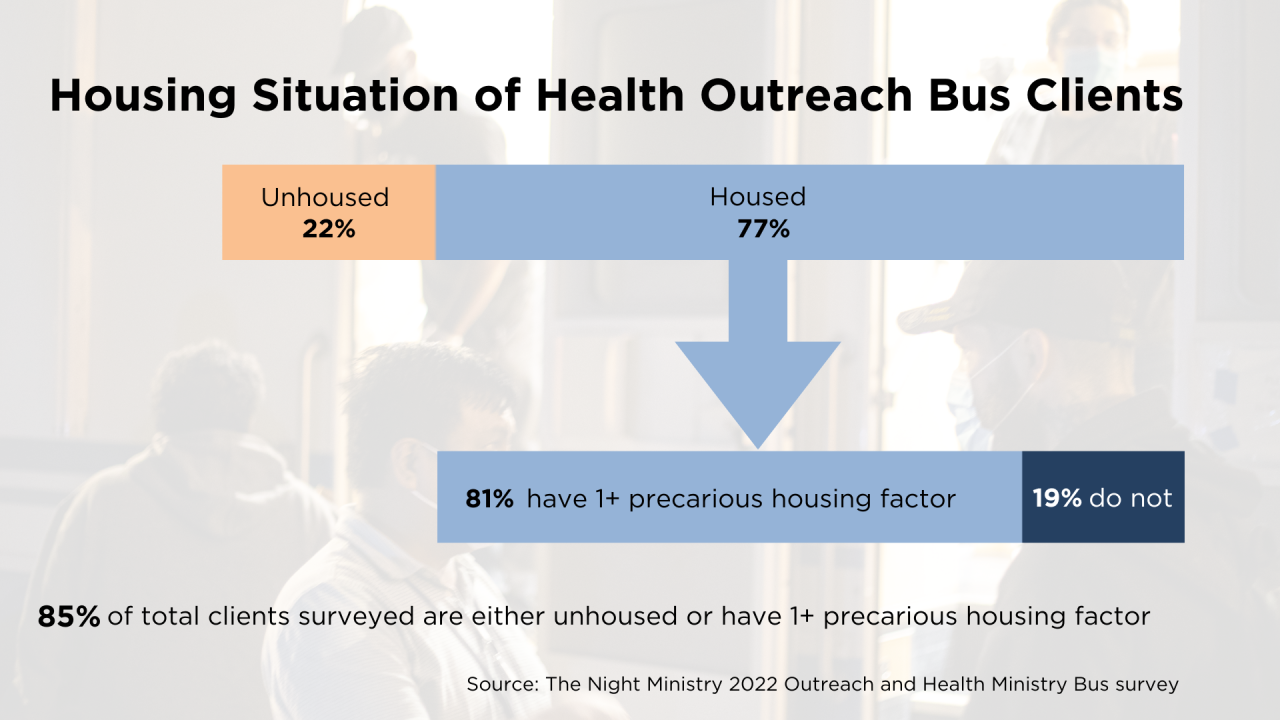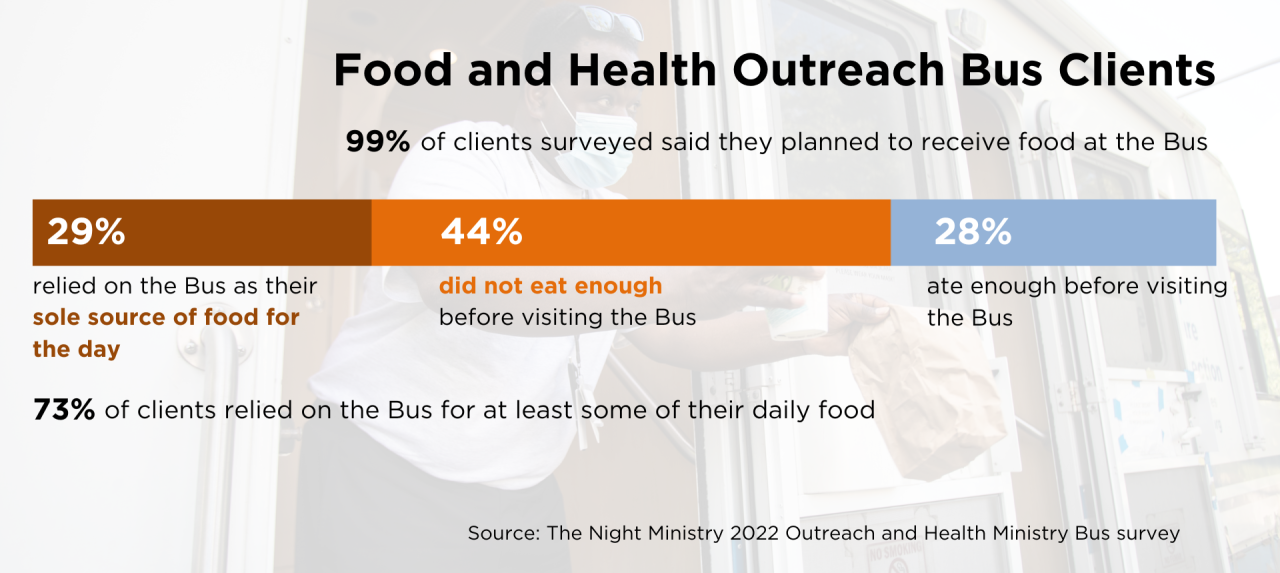Survey Confirms Health Outreach Bus Visitors Face Housing, Food Insecurity, and Health Care Challenges
 Outreach Professional Lavelle Horne provides a meal at the Health Outreach Bus. A new survey indicates that nearly three out of four visitors to the Bus rely on the program for at least some of their daily food intake.
Outreach Professional Lavelle Horne provides a meal at the Health Outreach Bus. A new survey indicates that nearly three out of four visitors to the Bus rely on the program for at least some of their daily food intake. Unstable housing, food insecurity, and limited access to health care remain widespread among visitors to The Night Ministry's Health Outreach Bus.
That's according to the 2022 Outreach and Health Ministry Bus survey, conducted by The Night Ministry's Learning and Impact department. The survey also finds that the Bus provides an important source of human connection for its visitors, Chicago residents who are unhoused or experiencing poverty.
The Health Outreach Bus brings free health care, supportive services, and resources such as food directly to Chicago neighborhoods with high concentrations of homelessness and poverty. Annual surveys among visitors to the Bus provide The Night Ministry with a deeper understanding of who the program's clients are, the challenges they face, and the services and resources they access at the Bus.
Demographic information collected during the 2022 Bus survey reflects housing and income inequities among historically marginalized Chicago residents. More than 60% of Bus clients identify as Black or African American; that's roughly double the percentage of Chicagoans who identify as Black or African American. Meanwhile over 20% identify as Hispanic or Latino. Only one in ten Bus visitors identify as white.
Although housing status varies among Bus clients, most are either unhoused or are living in precarious housing situations.
Roughly one in five Bus visitors reports living outside, in an abandoned building, or in a shelter, a ratio that has remained consistent through the years the survey has been conducted.
" Just as consistently, the majority of those who are housed tell us they have at least one condition indicating that their housing situation is precarious," said Damian Nelson, Director of Learning and Impact. "They may be 'doubled up,' staying temporarily in someone else's home, or they don't have a lease. Or the place where they live needs major repairs or they don't feel safe where they are living."
Consequently, housing is one of the major concerns that Bus Case Managers help clients address, linking them to longer term housing solutions such as units offered through the Chicago Housing Authority or forms of housing that include supportive services. Last year, 65 Bus clients engaged in housing case management, with eight finding more stable housing, while 41 clients applied for public housing with the help of the Bus Case Managers.
The survey indicates that the Bus program continues to help clients address a high level of food insecurity.
While nearly all visitors cite receiving a meal as one of the reasons for coming to the Bus, almost 75% of clients rely on the Bus program for at least some of their daily food intake.
Last year, medical professionals on the Bus prevented nearly 120 visits to the emergency room and treated more than 350 health conditions for which their patients would have otherwise not sought care if they had not visited the Bus. Survey results underscore the important role that the Bus plays in helping visitors access medical care. Overall, 15% of Bus clients have no health insurance, while more than a third report that they rely on the emergency room for primary care or would go to the emergency room if the Bus's health care services were not available to them.
The survey found accessing health care a particularly difficult challenge for residents of Pilsen, one of the neighborhoods served by the Bus.
"Over 60% of clients in Pilsen are uninsured," said Nelson. "The majority of those who are uninsured report relying on the emergency room for care, not seeking medical care at all, or not knowing where to go if the Bus were not there to provide health care services."
Bus visitors in Pilsen are also more likely to be unhoused, or, if they do have housing, to be significantly more rent-burdened, paying much more than is considered affordable for their housing.
"We don't ask this question, but we suspect that a large percentage of our Pilsen clients are undocumented," said Nelson. "Because of their immigration status, they are ineligible for a range of safety net services, such as food and unemployment benefits and subsidized housing."
The survey also found that the Bus plays an important role in fulfilling visitors' social needs.
"Folks who come to the Bus tend to have very few connections in their lives," said Nelson. "We know the connections Bus clients establish with The Night Ministry staff and with other visitors help alleviate the loneliness many of them feel."
"The vast majority, over 90%, believe they can trust the Bus staff, and eight out of ten clients report that talking to staff or each other at the Bus is important to them," he said.
Want to read more stories like this? Be sure to join our email community!

